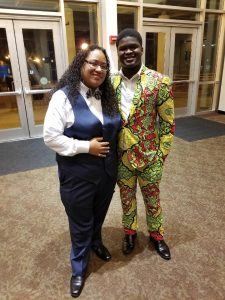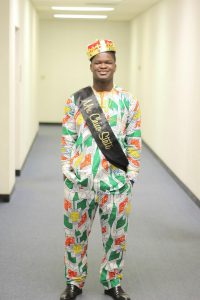Although he’s dealt with typical challenges that come with being the first person in his family to attend a university, Samuel Akinwande’s route to Chico State was far from typical.

Akinwande was born and raised in Nigeria, moving at age 11 to Inglewood, where education took a backseat to everyday worry about simply making it home alive after a day’s schooling.
“We had no help in high school when pursuing higher education,” Akinwande said. “Our counselors literally gave us our transcripts and said figure it out. That’s it.”
Chico State presented its own brand of culture shock to Akinwande, now a senior in the social work and Multicultural and Gender Studies program. But he became involved in multiple clubs and activities, serving as president of the African Student Union and Associated Students’ director of university affairs.
Moving from Africa to Inglewood in Los Angeles County was a painful change for Akinwande.
“I come from a place where there are no street lights,” Akinwande said. “So even getting used to that was difficult. I immediately didn’t want to go to school. The teachers looked down on me for my language barrier.”
Schooling for Akinwande was difficult because the British English he learned in Nigeria differs from American English.
“The teachers literally thought there was something wrong with me since my punctuation and spelling was wrong,” Akinwande said. “Nothing was offered to me in order to help me integrate into this new country. It made sense to me, though, since I lived in the ‘hood. Maybe if I lived in Beverly Hills or something there would have been more resources and help made available to me.”
Akinwande finally started to receive the attention he needed in high school when he was placed in an English-learning class.
“This was a surprise to me, as they waited three years to finally try and help me,” Akinwande said. “I was in classes with students who knew not even a lick of English. I knew English, (but) it was just the Queen’s English and over time I picked up American English.”
Growing up in Inglewood, Akinwande said survival took precedence over education.
“Leaving your house every morning to go to school you did not know if you would return alive,” Akinwande said. “Every morning your mother’s prayer was not for you to succeed in class, but her prayer for you is that you make it home alive.”
Akinwande went on to discuss how his African-American heritage has deeply affected his outlook on life and experiences at Chico State, which have drawn him to leadership roles.
“I never had anyone to motivate me outside of home and in an African home that motivation is to whoop your behind,” Akinwande said. “I grew up with an abusive stepfather and those experiences led me to live my life for others.”
In higher education, certain mentors have seen Akinwande’s potential, including Jovan Smith, a former supervisor who explained why he believes Akinwande is and will continue to be an exceptional leader: “Sam is authentic and leads with 100 percent of his heart. He has a great ability of empathizing with and caring for those around him, because he truly values people. Leaders are able to connect and relate to others, and that’s exactly what Sam does.”
Akinwande is pursuing a degree in social work and Multicultural and Gender Studies in order to help others in need.
“I looked around and thought to myself, ‘The way my people are living is terrible,’ so I wanted to be that change and support,” Akinwande said.
Coming to Chico State, the cultural upheaval continued for Akinwande, who again felt the help he needed to integrate as a first-generation college student was not provided.
“Luckily for me during orientation I met Krystle Tonga, who works at the Cross-Cultural Leadership Center (CCLC). She became my mentor and I now see her as an older sister,” Akinwande said. “However, as a black student on campus I cannot say I had resources provided to me to help me succeed, other than Krystle.”
Akinwande says he was one of the lucky ones because he found a mentor. He could rely on her when he needed help, but most of his friends were not as lucky.
When asked about Akinwande, Tonga said his experiences are shaped by his Nigerian background.
“At the age of 20 Sam was expected to become the head of the household after his grandfather passed away. That would never happen in the U.S.,” Tonga said. “He has had to go through some really toxic spaces, but he continues to push on and challenge the norm.”
Tonga said Akinwande’s Nigerian background, as well as being a young black man and the “first generation” to attend college, have set up obstacles for him at Chico State.
“There is a joke amongst me and my friends, that we cannot truly be ourselves on campus unless we’re at the Cross-Cultural Leadership Center,” Akinwande said.

No other spots on campus feel to Akinwande like the safe space the CCLC provides.
“This is where we can be loud; we come from a culture of loud,” Akinwande said. “That is how we express ourselves, and on most other places on campus we are being hushed.”
It took Akinwande some time to find his place at Chico State. He feels most comfortable on campus with his black peers and black faculty and staff, who can relate to him and understand his struggles.
Akinwande plans to obtain a bachelor’s degree next year and is considering pursuing a master’s degree. Eventually, he wants to return home and become president of Nigeria.
“If your dreams aren’t scaring people,” Akinwande said, “you’re not dreaming big enough.”
Nicte Hernandez is a journalism major at Chico State. She wrote this article as part of a Tehama Group Communications team working with ChicoSol.
